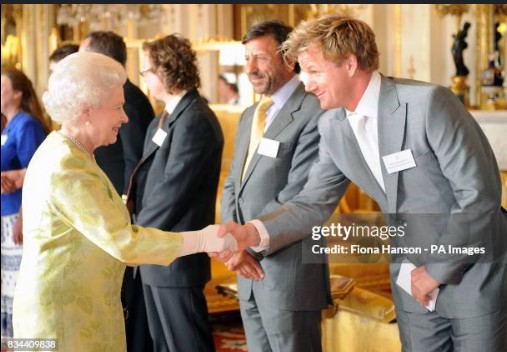
In a world where chefs are often seen as background players in the dining experience, Gordon Ramsay has become a household name—fiery, driven, and utterly devoted to the culinary arts. But beyond the fame, television shows, and Michelin stars, Ramsay received one of the highest honors a British citizen can be granted. In 2006, he was appointed an Officer of the Order of the British Empire (OBE) by Queen Elizabeth II in the New Year Honours list, a distinction that signified not only his excellence in cuisine but also his lasting impact on the hospitality industry.
The OBE is no ordinary accolade. It is awarded to individuals who have made substantial contributions to the arts, sciences, public service, or, in Ramsay’s case, to the field of hospitality and food. For a chef, this is akin to being knighted—not with a sword, but with a chef’s knife that has transformed not just kitchens, but the very culture of food in the United Kingdom and beyond.
Receiving the honor from the Queen herself was a surreal moment for Ramsay. Known for his intensity in the kitchen, he displayed a very different side at Buckingham Palace—humble, grateful, and visibly moved. It was a recognition not only of his hard-earned success but of the years he had spent tirelessly building an empire based on standards, discipline, and excellence.
By 2006, Ramsay had already amassed a remarkable list of accomplishments. His restaurant group, Gordon Ramsay Restaurants, was thriving, and he had earned multiple Michelin stars, including the prestigious three-star rating for Restaurant Gordon Ramsay in Chelsea—an honor that had remained unbroken since 2001. More than just a chef, Ramsay had become an ambassador for British cuisine, elevating it on the global stage and proving that the UK could compete with France and Italy in the world of fine dining.
His contribution also extended beyond food. Through his popular shows like Hell’s Kitchen, Kitchen Nightmares, and The F Word, he brought the often unseen world of professional kitchens into living rooms around the globe. He taught millions about passion, perfection, and persistence. And in doing so, he not only entertained—he inspired an entire generation of chefs, home cooks, and restaurateurs.
Being appointed an OBE marked a turning point in Ramsay’s career. It was the moment he transitioned from a brilliant chef to a national treasure. It showed that his influence was about more than culinary technique; it was about leadership, innovation, and his unrelenting drive to raise the bar in hospitality.
What makes Ramsay’s story even more compelling is where he came from. Born in Scotland and raised in England, his early life was marked by instability and hardship. He had dreams of becoming a footballer, but a career-ending injury forced him to turn to the kitchen. What began as a backup plan soon became a calling—one that led him to work under legends like Marco Pierre White and Guy Savoy, and eventually to forge a name that would echo across the world.
To go from those humble beginnings to receiving a medal from the Queen is a journey that embodies the power of resilience and vision. Gordon Ramsay didn’t just earn an OBE—he earned the respect of a nation and the admiration of the world.
